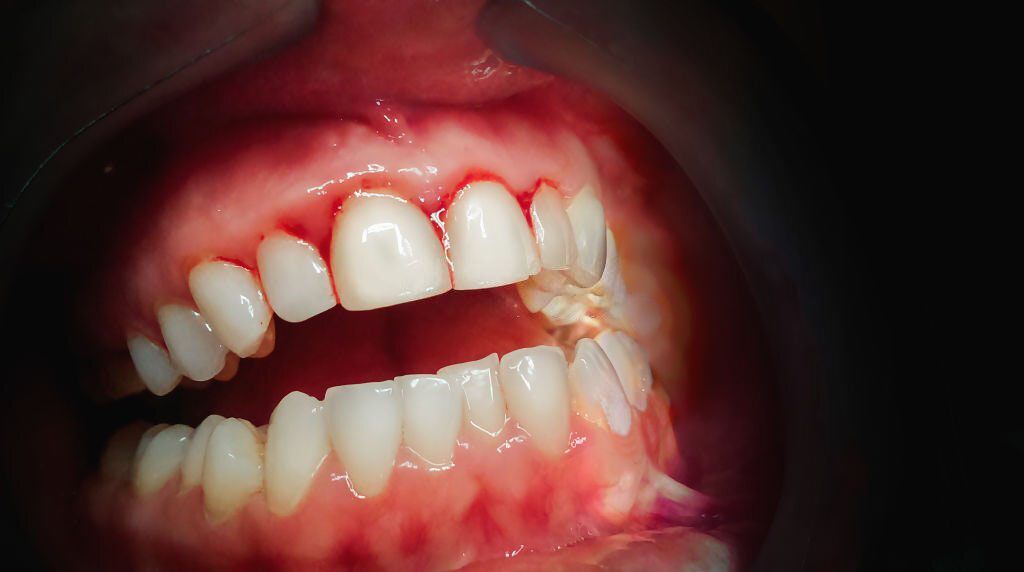This article is reviewed, corrected, and approved by: Dr. Joshua Collins M.D. | MRCP। FRCP
If your dentist has told you that you have gingivitis, you may be wondering if it is curable. The good news is that gingivitis is a relatively easy condition to treat, and in most cases, it can be cured fairly quickly.
In this article, we will discuss the causes of gingivitis, the symptoms, and how it can be treated. We will also provide some tips on how to prevent gingivitis from developing in the first place!
What is Gingivitis?

Gingivitis is an inflammation of the gums. It's caused by bacteria that accumulate in plaque along the gum line, which leads to irritation and swelling. If left untreated, it can progress to a more serious gum disease called periodontal disease.
Symptoms of gingivitis include redness and swelling of the gums, bleeding gums while brushing or flossing teeth, bad breath (halitosis), receding gums, and tenderness when touching the affected area. In some cases, there may also be pain while eating or drinking hot/cold foods/drinks.
It is important to note that early detection and treatment of gingivitis can help prevent it from progressing into periodontal disease. This is why it's so important to visit your dentist on a regular basis for routine check-ups and cleanings. Your dentist will be able to detect signs of gingivitis and recommend the appropriate treatment.
Is Gingivitis Hereditary?
We already got to know what gingivitis is. But what exactly causes gingivitis? Is it hereditary, or are there other factors at play?
Evidence suggests that genetics may be a factor when it comes to developing gingivitis. Studies have shown that people with a family history of gum diseases like periodontal disease are more likely to develop gingivitis than those without such a family history. However, this does not mean that you will automatically get it if someone else in your family has had it.
Environmental factors and lifestyle choices can also contribute to the development of gingivitis or make it worse. The good news is that regardless of its cause, gingivitis is treatable and preventable with proper oral hygiene habits.
Risk of Gingivitis- Can Gingivitis Kill You?

Gingivitis is a serious condition that can lead to more advanced gum disease problems, including periodontal disease and tooth loss. If left untreated, gingivitis can even become life-threatening.
The bacteria associated with the infection can spread throughout your body via the bloodstream, leading to potentially fatal complications such as endocarditis (inflammation of the inner lining of your heart) and sepsis (a life-threatening systemic infection).
Additionally, gingivitis has been linked to other health issues such as stroke, diabetes, and cardiovascular disease. Therefore, it is important to practice good oral hygiene, including brushing twice a day for two minutes each time and flossing once daily in order to keep your gums healthy and prevent the onset of gingivitis.
How to Reverse Gingivitis?

Living a life with gingivitis can be quite painful. Fortunately, you can reverse gingivitis with proper dental care and home remedies. Here are some tips to help reverse gingivitis:
Proper Brushing
Brush your teeth twice daily with a soft-bristled toothbrush and fluoride toothpaste. Use fluoride toothpaste or tartar control toothpaste as it is very effective to kill bacteria and remove plaque from between the teeth. Replace your toothbrush every three months or after any illness.
Floss daily to remove food particles from between your teeth and beneath the gum line, where brushing cannot reach them. Use an antimicrobial mouthwash to reduce bacteria in your mouth that could lead to plaque buildup on teeth and gums.
Refrain From Smoking
Smoking is known to have many negative effects on both the health and appearance of people. If you are a smoker, one of the common concerns that may arise is gingivitis. Those that chew tobacco and smoke are more inclined to suffer from this condition as the many components of cigarettes, like tar and nicotine, combine to damage the mouth and teeth.
The best way to prevent gingivitis is to quit smoking, as this will help to improve your overall oral health. Quitting smoking isn't easy, but it certainly beats dealing with poor dental health!
Limit Sugary and Starchy Foods
Eating sugary foods and a lot of starches can do more than just increase your waistline – it can also cause gingivitis. Studies have proven that limiting these sugary and starchy foods could help prevent or even reverse the earliest stage of gingivitis. Not only does this save you time and money spent in the dentist's office, but it also helps protect your overall health, as gum disease can lead to periodontitis, which increases your risk for serious medical conditions.
To keep your mouth healthy and free from pain, limiting your intake of sugary and starchy snacks is an important part of preventive dental care.
Regular Dentist Visits
It is also important to see your dentist regularly for checkups and cleanings. During these dental appointments, your dentist can treat gingivitis bumps on gum and remove any plaque and tartar buildup that you may have missed while brushing. Your dentist can also recommend other treatments, such as periodontal therapy, medicated or antiseptic mouthwashes, and gels, to help reverse the effects of gingivitis.
In more severe cases, a periodontist may need to be consulted for further treatment options, such as dental restoration. In addition to professional dental care, there are some home remedies that can help reduce inflammation caused by gingivitis:
- Eat a healthy diet rich in Vitamin C.
- Rinse with salt water or hydrogen peroxide.
- Use neem twigs instead of toothbrushes. Massage your gums with a warm washcloth and
- Apply clove oil to your gums.
By following these tips, you can improve your poor oral hygiene, prevent gingivitis and reduce the risks of developing gum disease. Remember, proper oral hygiene is key to maintaining a healthy mouth, teeth, and gums!
Conclusion
We hope you enjoyed reading this post and found it helpful. Remember, gingivitis is a condition that can be easily avoided by practicing good oral hygiene. There are a number of ways to prevent and treat gingivitis, depending on the severity of your condition.
Some simple lifestyle changes can make a huge difference, like brushing and flossing regularly, eating a healthy diet, quitting smoking, and visiting your dentist regularly for cleanings. In more serious cases, you may need medication or surgery.
Gingivitis is a common but serious condition that should not be ignored. With a proper treatment plan, it is possible to reverse the damage and prevent it from progressing into something worse.
Frequently Asked Questions (FAQs)
Question 1: How long does it take gingivitis to go away?
Answer 1: With proper health care and treatment, gingivitis go away within 10 to 14 days.
Question 2: Does salt water help gingivitis?
Answer 2: Plaque and germs on your teeth and gums may be removed with salt water. Salt contains anti-inflammatory characteristics that can be used to treat and repair inflamed or swollen gums caused by gingivitis. Although salt water is particularly helpful in treating gum disease, it cannot cure gingivitis.
Question 3: Is gingivitis contagiousAnswer 3:
Answer 3: The germs that cause gingivitis can proliferate through saliva-to-saliva contact. If you develop gingivitis, you can spread the disease to others by kissing or sharing beverages, utensils, and toothbrushes.


